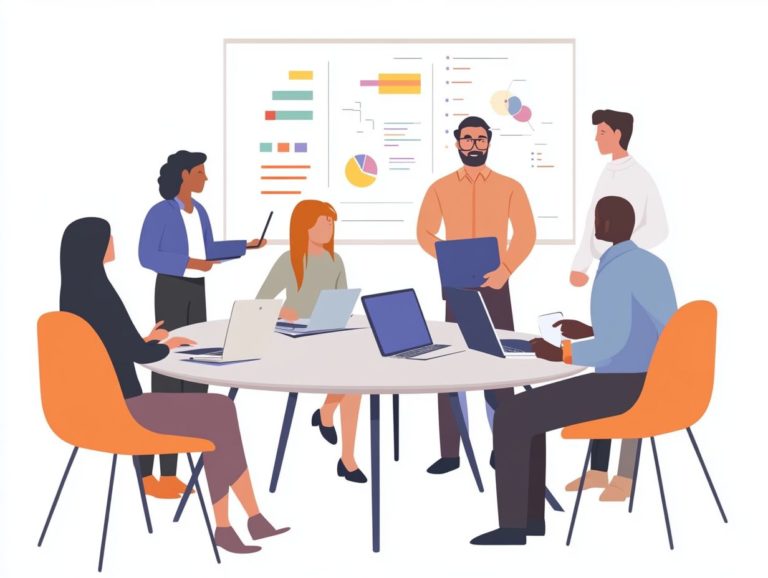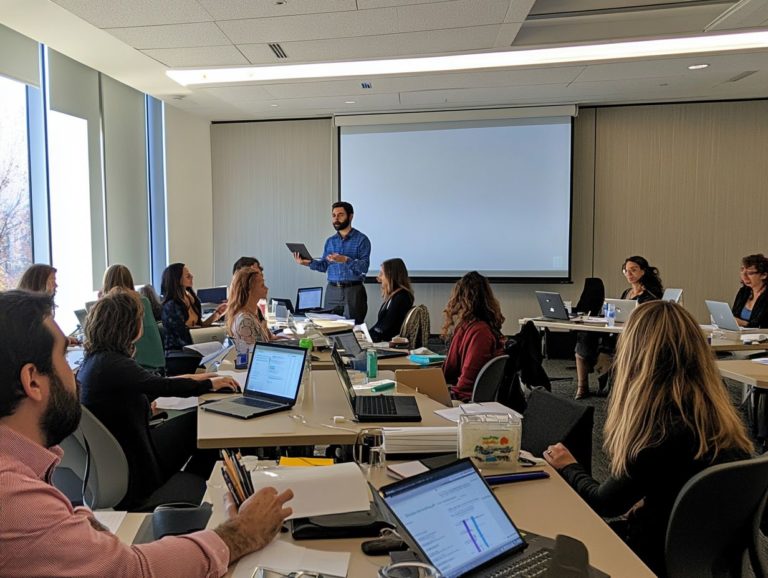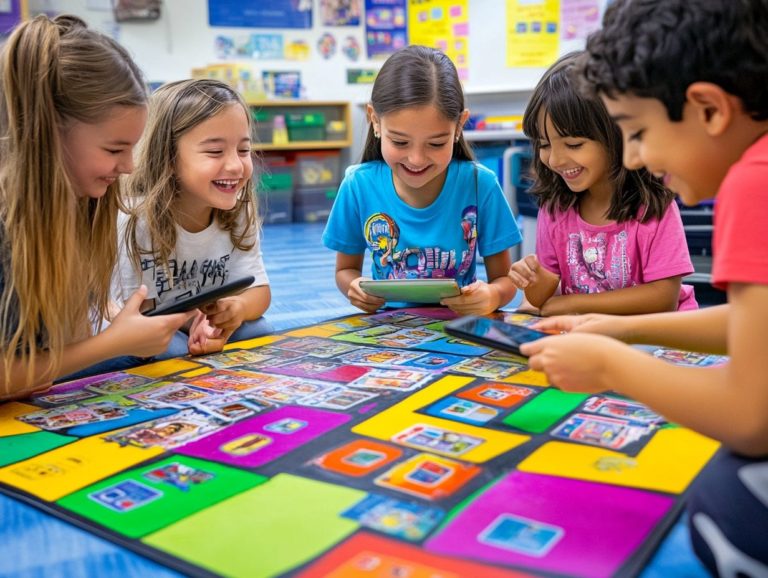How to Leverage Social Media for Skill Development
In today’s digital landscape, social media has evolved from a mere connection tool into a formidable asset for both personal and professional growth.
Whether you’re aiming to refine your skills or venture into new areas of interest, the right social media platforms can provide an abundance of resources at your fingertips.
This article will guide you in selecting the most relevant platforms, engaging with communities, and leveraging tools that enhance your learning experience.
You’ll uncover best practices for tracking your progress and achieving your learning goals.
Jump in now to unlock the incredible power of social media for your skill development journey!
Contents
- Key Takeaways:
- Identifying and Choosing Relevant Platforms
- Using Social Media for Learning and Development
- Measuring Progress and Success
- Best Practices for Leveraging Social Media
- Frequently Asked Questions
- What is social media? How does it help with skill development?
- Which social media platforms are best for skill development?
- How Can I Use Social Media to Learn New Skills?
- Can Social Media Be Used for Skill Development in a Professional Setting?
- Are There Any Potential Drawbacks to Using Social Media for Skill Development?
- How Can I Stay Motivated and Accountable When Using Social Media for Skill Development?
Key Takeaways:
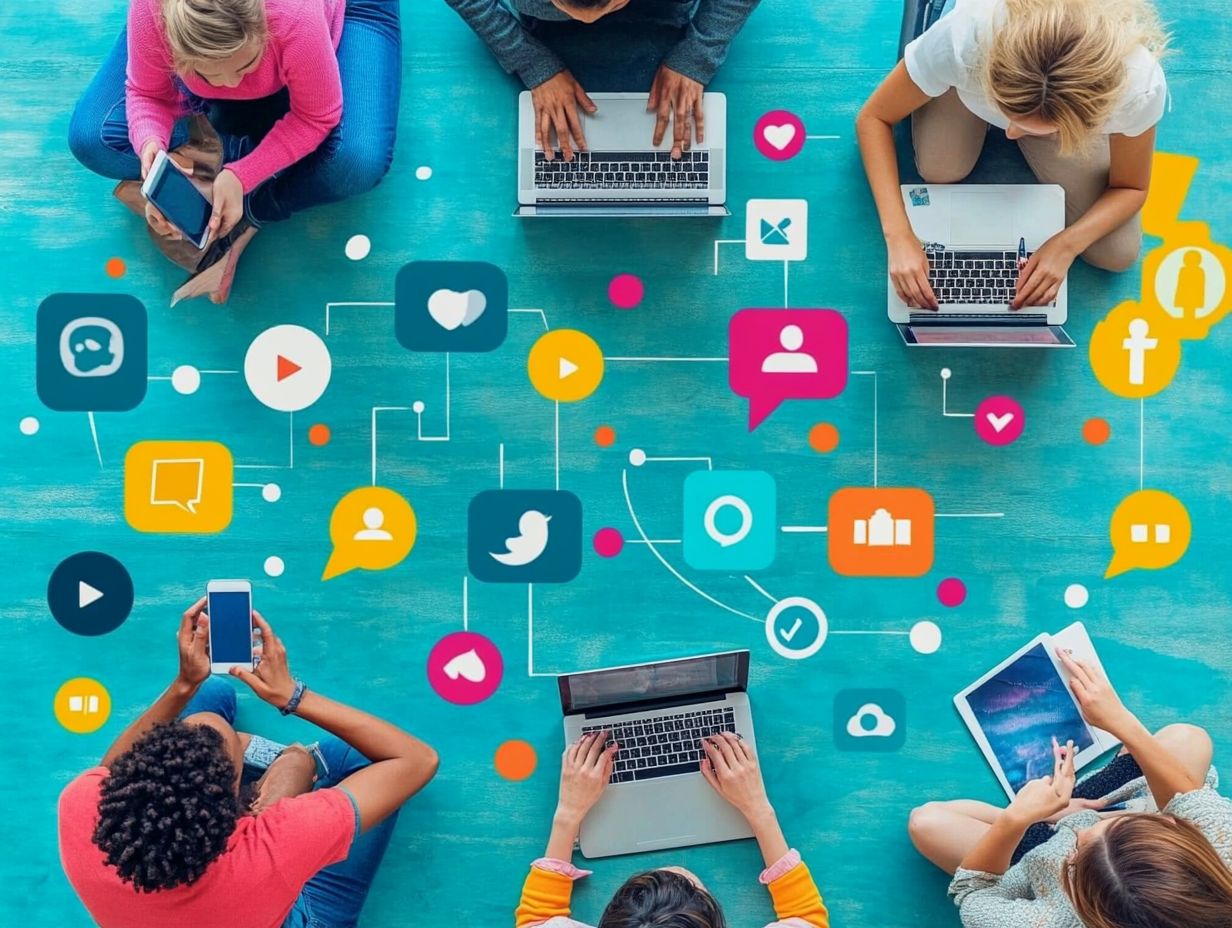
- Social media offers a vast array of resources and tools for skill enhancement.
- Choose the platforms that align with your learning goals to maximize benefits.
- Measure and track your progress using analytical tools and community support.
Why Use Social Media for Skill Development?
Leveraging social media for skill development offers a remarkable avenue for your professional growth and career advancement. Enhance your personal brand with platforms like LinkedIn. They help you showcase your achievements and connect with industry leaders.
Engaging with online communities fosters continuous learning and opens up networking opportunities, helping you stay informed about industry trends and news.
In the fast-paced realm of Twitter, you can dive into real-time discussions and share insights, making it an ideal platform for keeping up with emerging ideas and technologies. By participating in relevant hashtags or Twitter chats, you can exchange knowledge with peers from around the globe.
Facebook groups provide a more intimate space for in-depth conversations, allowing you to seek feedback and resources on specific skills. Mastering digital etiquette in these interactions is paramount; showing respect and engaging thoughtfully can elevate your reputation and lead to meaningful connections.
Ultimately, employing effective engagement strategies across these platforms can significantly enhance both your personal and professional development.
Identifying and Choosing Relevant Platforms
Selecting the ideal social media platforms for skill development is essential, as each one presents distinct advantages for professional networking and personal branding.
LinkedIn is particularly noteworthy for Job Searches and building professional relationships, while platforms like Instagram and YouTube excel in offering visual branding opportunities through compelling video content and storytelling.
By grasping the unique features of each platform, you can refine your engagement strategies to maximize your impact.
Understanding Different Social Media Platforms
Each social media platform brings its own set of features and audience demographics, making it crucial for you to understand their nuances for effective skill development and professional branding. LinkedIn is your go-to for business networking and job opportunities, while Facebook and Instagram thrive on community engagement and personal storytelling.
Twitter, with its focus on real-time updates, serves as an exceptional hub for industry news and thought leadership.
By harnessing these unique functionalities, you can elevate your digital branding and gain valuable insights about your audience. For example, LinkedIn s powerful networking tools allow you to connect not only with peers but also with potential employers, making it the perfect platform for career advancement.
Conversely, Instagram s visual storytelling is ideal for creatives eager to showcase their portfolios or share their journeys, while Facebook groups can cultivate community discussions that enrich your professional development. In Twitter s fast-paced environment, you have the opportunity to engage in timely conversations, keeping you informed about industry trends and helping you connect with influential figures.
Assessing Your Learning Goals
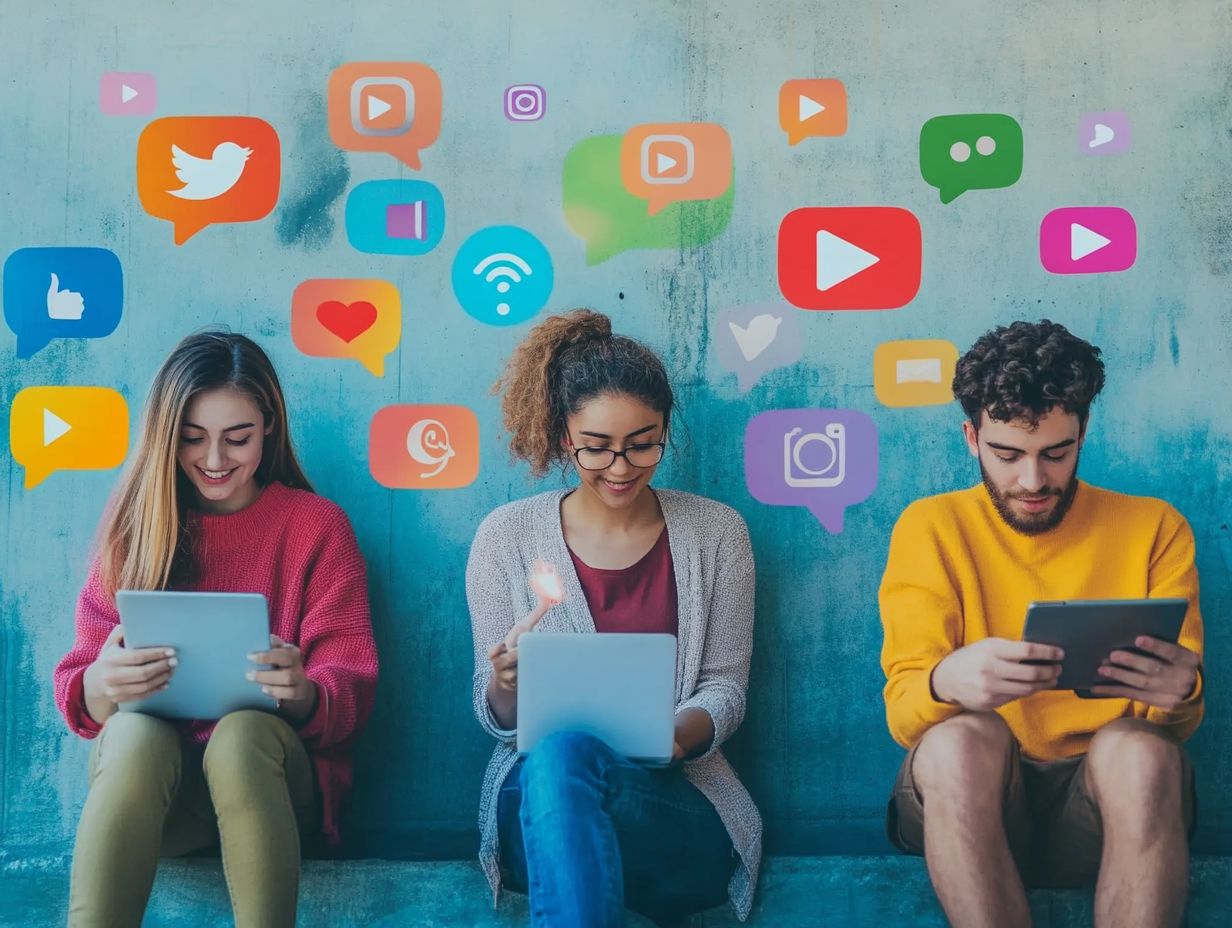
Assessing your learning goals is a crucial first step in leveraging social media for effective skill development. This clarity will inform your content creation and engagement strategies.
Define the specific skills you wish to acquire or enhance. Pinpoint the right online communities and resources that will support your journey.
Whether it’s through interactive webinars or engaging discussions, aligning your goals with your social media activities will boost your online presence and make you stand out!
Seeking feedback from peers and mentors enriches this process. It offers valuable insights into content performance and highlights areas for improvement.
Actively engaging in discussions sharpens your objectives and cultivates a sense of community, which is vital for maintaining motivation. Practicing digital etiquette respectful online behavior is essential; it fosters trust and invites constructive criticism.
Use these resources to create a rich learning experience that aligns with your goals!
Using Social Media for Learning and Development
Social media stands as a formidable tool for your learning and development, enabling connections with industry leaders and encouraging active participation in online communities.
By leveraging platforms like LinkedIn and Twitter, immerse yourself in discussions, exchange insights, and tap into valuable resources, all while enhancing your skills in real-time.
The ability to create and consume content tailored to your specific learning objectives reshapes the traditional landscape of education, allowing for a more active and personalized experience.
Finding and Engaging with Relevant Communities
Finding and engaging with relevant online communities is essential to fully harness the power of social media in your learning and development journey.
By connecting with professionals who share your interests and goals, you gain access to a wealth of knowledge and resources that will supercharge your growth!
Platforms like LinkedIn Groups and Facebook Communities offer vibrant spaces for interaction. Learn from industry leaders and peers through their shared experiences and advice.
To discover these dynamic online communities, take time to browse industry-specific forums, social media platforms, and relevant hashtags. Actively participating in discussions boosts your visibility and opens the door to valuable networking opportunities, leading to mentorship or collaborative projects.
When you share personal insights and pose thoughtful questions, you encourage a lively exchange of ideas. This fosters a sense of belonging while enriching the collective knowledge of the community.
Adopt interaction strategies such as commenting meaningfully on posts or attending virtual meetups. These can significantly enhance your professional connections and provide a solid foundation for your ongoing development.
Utilizing Tools and Resources for Skill Development
Utilizing a diverse array of social media tools and resources can significantly elevate your skill development journey, providing structured pathways for both learning and engagement.
From online workshops and webinars that facilitate live interaction with industry experts to innovative tools that enhance content creation, these resources empower you to showcase your skills and accomplishments effectively.
By leveraging these options, you open the door to increased visibility and abundant opportunities for career advancement.
In today s changing digital landscape, platforms like Canva for design, Buffer for social media management, and Coursera for structured learning can play a crucial role in enhancing your online presence.
These tools inspire creative expression and aid in cultivating a personal brand that resonates with your audience.
For instance, using video editing software like Adobe Premiere can transform the way you present your achievements. By strategically incorporating these resources into your narrative, you can craft a compelling story that highlights your unique skill set, ultimately leading to a more robust and distinct professional identity.
Join a LinkedIn Group today to start engaging with peers!
Measuring Progress and Success

Measuring your progress in skill development through social media is essential. It ensures that your efforts produce meaningful results. By leveraging tools that help analyze your social media performance, you can assess content performance, audience engagement, and feedback insights.
This enables you to refine your strategies and objectives as needed. Regularly evaluating your progress sharpens your approach and boosts your confidence as you navigate your professional journey.
Tracking and Analyzing Your Learning Journey
Tracking and analyzing your learning journey is crucial for understanding your progress. It helps pinpoint areas that need improvement in your skill development efforts. By keeping a detailed record of your engagements and results, you gain valuable insights into your audience that shape your future strategies.
This reflective practice not only boosts your professional growth but also nurtures a mindset of continuous learning.
Utilizing a variety of methods can significantly enhance this process. For example, digital journals allow you to document your experiences and thoughts, making it easier to reflect on your personal growth over time. Meanwhile, social media analytics tools provide a clear overview of engagement metrics, helping you assess which content resonates most with your audience.
By combining these tools with consistent feedback mechanisms and collaborative platforms, you can craft effective engagement strategies that actively support your skill enhancement goals, keeping the learning process dynamic and engaging.
Best Practices for Leveraging Social Media
Implementing best practices for leveraging social media is essential for unlocking its full potential in fostering effective learning and professional growth. Maintaining a consistent posting schedule while engaging thoughtfully in online discussions greatly enhances your online presence and visibility.
Adhering to digital etiquette is crucial. This ensures your interactions remain respectful and professional, enriching your networking opportunities.
Tips for Effective and Efficient Learning
To truly maximize your learning experience through social media, implement targeted strategies that align with your goals. Engage with thought leaders in your industry, dive into relevant discussions, and consistently offer your insights to elevate your online presence. These practices foster skill development and enhance your professional identity in the digital realm.
Using hashtags strategically can significantly boost your visibility and help you connect with like-minded individuals. Curating and sharing a list of valuable resources establishes you as a knowledgeable source, encouraging meaningful interactions with your peers.
Don t underestimate the power of multimedia. Creating eye-catching visuals or short videos greatly enhances audience engagement. Regularly evaluate the impact of your content through analytics to ensure your efforts align with your professional goals while guiding your future strategies.
Nurturing relationships and maintaining an active digital presence opens up invaluable avenues for collaboration and growth in today s interconnected world.
Frequently Asked Questions
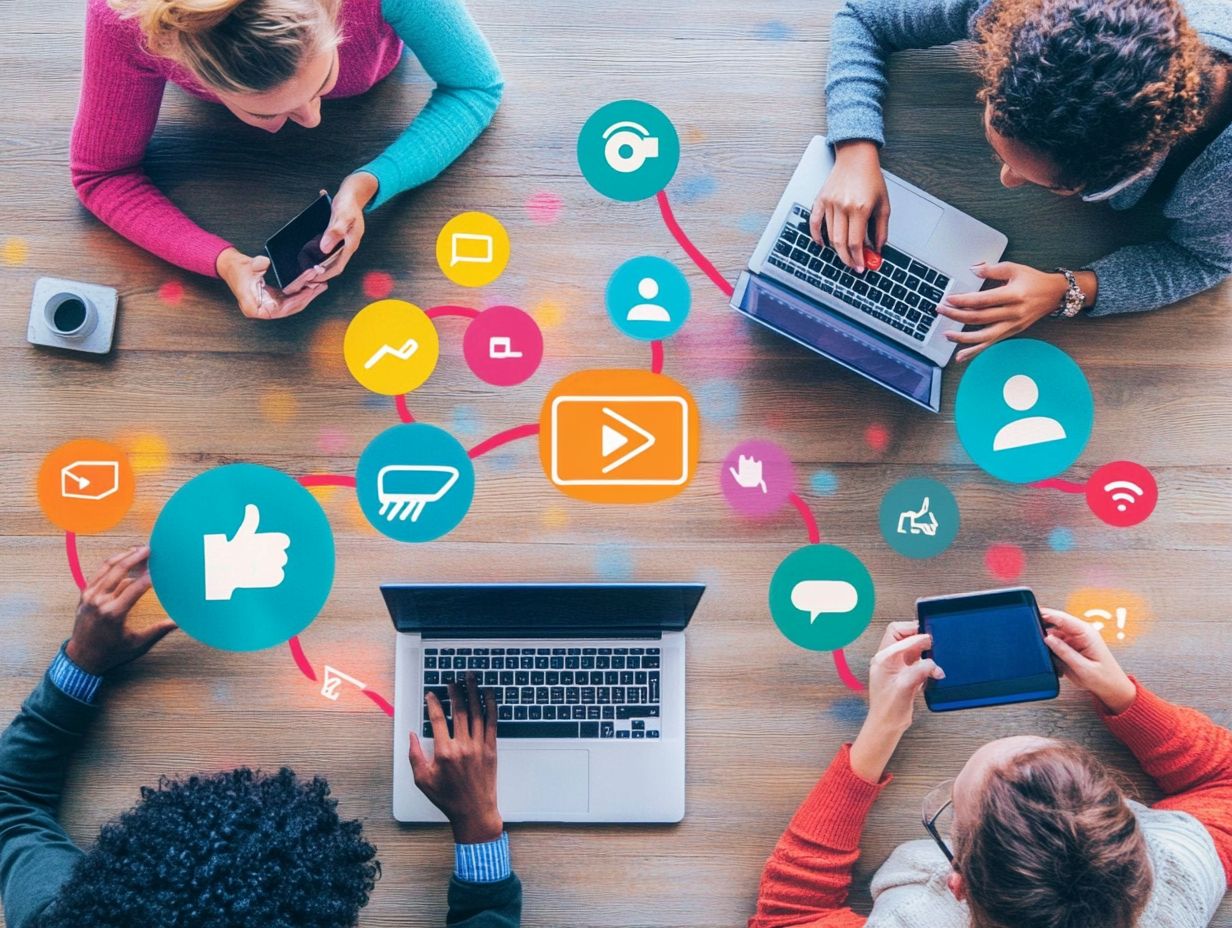
Social media refers to various online platforms and tools that allow users to create and share content, connect with others, and engage in virtual communities. It can be leveraged for skill development by providing access to a wide range of educational and informative resources, networking opportunities, and collaborative learning experiences.
The best social media platforms for skill development vary depending on the specific skills you want to develop. For example, LinkedIn is great for professional networking and career development. YouTube and Instagram are useful for learning visual or creative skills. It’s important to research and choose the platforms that align with your goals and interests.
How Can I Use Social Media to Learn New Skills?
Use social media to learn by following industry experts and joining relevant groups. Participate in online courses and workshops, and consume educational content like articles and videos.
Engage in discussions and ask questions to gain insights and feedback from others.
Can Social Media Be Used for Skill Development in a Professional Setting?
Yes, social media is a valuable tool for professional skill development. Many companies use it for employee training and to promote continuous learning.
Professionals can also showcase their skills and build their personal brand while staying updated on trends.
Are There Any Potential Drawbacks to Using Social Media for Skill Development?
While social media is a great resource, be aware of potential drawbacks like distractions and misinformation. Always evaluate the content and sources critically.
How Can I Stay Motivated and Accountable When Using Social Media for Skill Development?
Set specific goals and track your progress to stay motivated. Join online communities to connect with others working on similar skills for support.
Regularly reflect on the growth you’ve achieved through social media to maintain your motivation.

